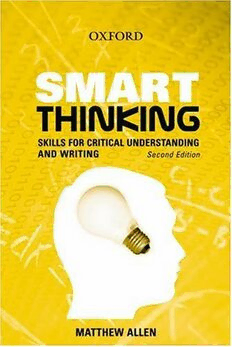
Smart Thinking: Skills for Critical Understanding and Writing PDF
Preview Smart Thinking: Skills for Critical Understanding and Writing
S M A RT THINKING For Jane and Verity (as ever) S M A RT THINKING SKILLS FOR CRITICAL UNDERSTANDING AND WRITING Second Edition MATTHEW ALLEN OXFORD UNIVERSITY PRESS OXFORD UNIVERSITY PRESS 253 Normanby Road, South Melbourne, Victoria 3205, Australia Oxford University Press is a department of the University of Oxford. It furthers the University's objective of excellence in research, scholarship, and education by publishing worldwide in Oxford New York Auckland Bangkok Buenos Aires Cape Town Chennai Dar es Salaam Delhi Hong Kong Istanbul Karachi Kolkata Kuala Lumpur Madrid Melbourne Mexico City Mumbai Nairobi Sâo Paulo Shanghai Taipei Tokyo Toronto OXFORD is a trade mark of Oxford University Press in the UK and in certain other countries Copyright © Matthew Allen 1997, 2004 First published 1997 Reprinted 1997, 1998, 1999, 2001 Second edition published 2004 This book is copyright. Apart from any fair dealing for the purposes of private study, research, criticism or review as permitted under the Copyright Act, no part may be reproduced, stored in a retrieval system, or transmitted, in any form or by any means, electronic, mechanical, photocopying, recording or otherwise without prior written permission. Enquiries to be made to Oxford University Press. Copying for educational purposes Where copies of part or the whole of the book are made under Part VB of the Copyright Act, the law requires that prescribed procedures be followed. For information, contact the Copyright Agency Limited. National Library of Australia Cataloguing-in-Publication data: Allen, Matthew, 1965-. Smart thinking: skills for critical understanding & writing. 2nd ed. Bibliography. ISBN 0 19 551733 4. 1. Critical thinking. 2. English language - Rhetoric. 3. Reasoning (Psychology). 4. Thought and thinking. I. Title. 153.42 Typeset by OUPANZS Printed through Bookpac Production Services, Singapore Contents Preface to First Edition viii Preface to Second Edition ix How to Use this Book xi 1 Smart Thinking 1 What is smart thinking? 1 How do we study smar tthinking? 5 Why do we need to 'think smart'? 7 2 Claims: The Key Elements of Reasoning 9 Understanding language 10 More about claims 14 Claims and reasoning 18 Review 22 3 Linking: The Key Process in Reasoning 25 Links between claims 26 The analytical structure of reasoning 28 Learning more about the analytical structure 31 Review 37 4 Understanding the Links between Claims 39 Dependent premises 39 Vi CONTENTS Special functions of premises 44 The link from premises to conclusion 47 Review 53 5 More Effective Reasoning I: Better Claims 55 Well-formed claims 56 Well-founded claims 60 Review 67 6 More Effective Reasoning II: Better Links 69 Effective use of dependent premises 70 Relevance 74 Strength of support 80 Review 86 7 What Kinds of Reasoning are There? 89 Deductive and inductive reasoning 89 Categorical and propositional logic 92 Five types of reasoning 93 Review 100 8 Research, Reasoning, and Analysis 102 Reasoning and analysis 103 Information understood by where we find it 106 Information as it relates to other information 108 Information classified by the topic under investigation 109 Information as it relates to how we are using it 111 Direct and indirect sources 113 Review 117 9 Planning and Creating Your Reasoning 120 The key analytical questions 121 Using the analytical structure for planning 127 Review 132 CONTENTS vii 10 Bringing It All Together: Narrative and Structure 134 Example text 134 Casting and notes on each paragraph 137 Capturing the essence of the text 146 Overall narrative flow of the text 147 Summary 149 Answers, Discussion, and Further Advice 150 Glossary of Key Terms and Concepts 174 Further Reading 186 Guide to Important Skills 190 Preface to First Edition The study and teaching of critical thinking (also known as informal logic) is relatively rare in Australia. There is little to guide the keen student or teacher in the development of skills for analysis and reasoning in everyday work and study. The orientation of most of the available books on this subject is more traditionally logical, and this orientation further complicates the process of teaching and learning applied critical thinking skills, since it tends to remove the use of reasoning and logical analysis from even its most basic social contexts. Smart Thinking'is designed to provide a simple, but not simplistic, guide for the development of critical thinking and analytical skills. It combines the undoubted strengths of the informal logical approach with a newer—but often-overlooked— insight: that reasoning and analysis are always communicative acts. I would not pretend that one can easily resolve the epistemological tensions between, on the one hand, the commonly held commitments to objective judgment and truth that underpin 'logic' as a mode of analysis and, on the other, the social relativism and intersubjectivity that a communicative-theory approach demands. However, from a pragmatic point of view, there is considerable profit to be gained from letting these two distinct approaches jostle alongside one another. Moreover, for all my attempts to keep competing epistemological ideas to a minimum in Smart Thinking, the book cannot remain purely 'practical'. Simple advice on 'better thinking' rubs up against deep and important matters of philosophy in a way that, I hope, creates a constructive interaction between the ease with which one can begin to improve one's thinking and the complexity of thinking about smart thinking. While I myself work theoretically within post-structuralist frameworks, Smart Thinkings bias towards communicative issues stems primarily from the very practical experiences I had in developing and teaching a critical thinking unit (Applied Reasoning 200) at Curtin University of Technology in Perth. On the basis of my experiences with many hundreds of students, I am confident in asserting that it is wrong to divorce analytical thinking from its communicative context. Outside the narrow confines of some academic disciplines, communication takes place on a VIII
